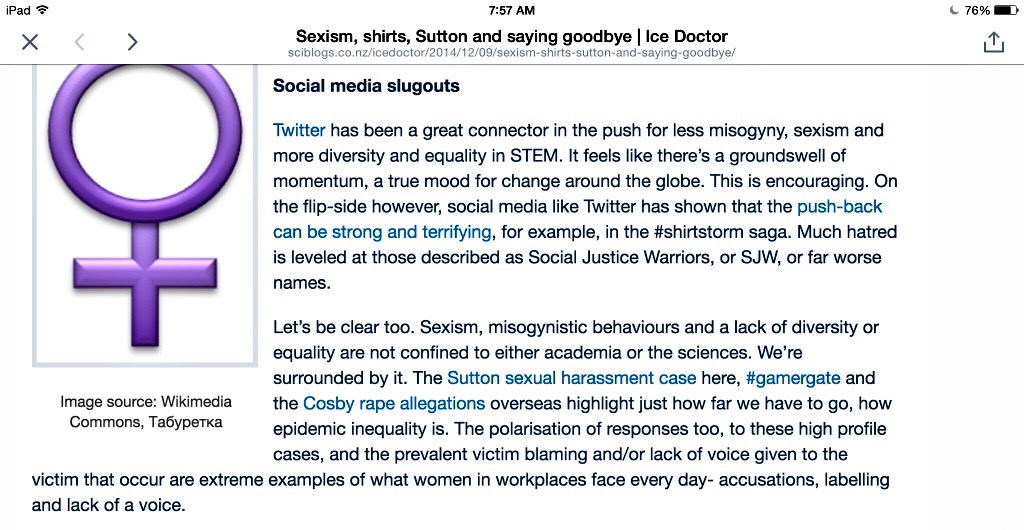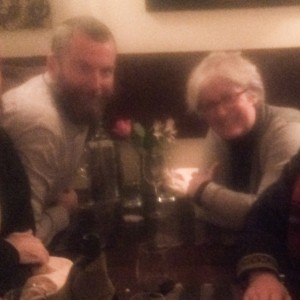 Given the sexual harassment of female students that I directly witnessed when I was a student doing field work, I've been infuriated by the Jian Ghomeshi debacle with its victim blaming. Although the sexual harassment that I personally witnessed happened 30 years ago, it, too, still makes me cross. So, Clancy et al's 2014 PLOS ONE paper on what appears to be pretty commonplace ongoing sexual harassment of field researchers struck a real nerve with me. I keep asking myself, have we really moved on so little in 30 years? And, how surprised should I be by this lack of change? I've not only been having this conversation with myself, but also with colleagues old and new, like Dr. Alan McElligott (left in the photo at right), whom I finally met in person last Tuesday.
Given the sexual harassment of female students that I directly witnessed when I was a student doing field work, I've been infuriated by the Jian Ghomeshi debacle with its victim blaming. Although the sexual harassment that I personally witnessed happened 30 years ago, it, too, still makes me cross. So, Clancy et al's 2014 PLOS ONE paper on what appears to be pretty commonplace ongoing sexual harassment of field researchers struck a real nerve with me. I keep asking myself, have we really moved on so little in 30 years? And, how surprised should I be by this lack of change? I've not only been having this conversation with myself, but also with colleagues old and new, like Dr. Alan McElligott (left in the photo at right), whom I finally met in person last Tuesday.
I'm an ecologist and ecological theory is framed by evolution. I studied animal behaviour for my doctorate, so I'm very comfortable with publicly discussing sperm competition, infanticide and testicle size. I'm off to the Reykjavik Phallalogical Museum this morning, with my husband and daughters! I was a student at the time of the EO Wilson vs. Lewontin & Gould sociobiology wars. Therefore, I've grown up with the nature vs. nurture debate, and how it has framed debates about female intelligence in particular and feminism in general.
I also study population biology and aspects of life history and demography (of plants). Therefore, on reflection, I think that I should NOT be surprised that the social-cultural norms around women in STEM have been so slow to shift. One obvious reason for this, is that tenured professors have careers spanning decades, resulting in the top level of academic power holders and influencers being in place, and able to consciously or unconsciously resist, and slow down, the shift of cultural norms for years.
Faculty members that I KNOW harassed students in field work situations back in the 1980s, because I saw it with my own eyes, are still employed and publishing. Thus, I must conclude that it is very rare for the system to call out this behaviour. Moreover, whistleblowers face some very real consequences.
I'm now one of those academics who has been in the system for decades. My publicly stated agenda is to actively support efforts to increase the number of women in STEM, and all that this entails. I'm also very interested in seeing a more diverse professoriate in terms of people of colour.
Yet, I continue to find that, even WITH academic longevity, and stature as a full professor who is a multiple-award winning university teacher and fairly well respected (nicely in the middle of the pack, and definitely standing on the shoulders of giants) researcher, that holding people in academia accountable for various levels of bad behaviour, from simply being an unethical jerk, to more stunning levels of inappropriate behaviour, continues to be very difficult. The term "closing ranks" definitely still applies in academia.
In this post, I'm reflecting more than I have in a long time, about the issue of sexual harassment. This is because, although I have witnessed sexual harassment & gendered bullying in many university departments and field situations, I've never been sexually harassed myself, though I have definitely been on the receiving end of gendered bullying by male academics. They would NEVER say, or write, these things to their male colleagues. These male faculty are so oblivious about structural sexism, that I have concluded, it's pretty pointless at their career age and stage for me to to waste my time trying to educate and enlighten them.
Yet another example of why I hold this opinion happened just over a year ago when a male colleague from another Toronto university told me directly, that my interest in increasing in the number of women in STEM, was simply me "projecting" my aspirations onto young female students, whom, he boldly opined, most probably have no interest at all in the long hours that academic science research careers require ( I kid you, not). Since it was a social event, I really had no choice but to hold my tongue and walk away.
It's my opinion that there is a lot of delusional thinking out there amongst my peer-group of male colleagues. They firmly believe that they have done their duty for women in science during the last couple of decades, and that the problem has been solved by them, and their actions as much as is possible!
But, I digress. In my youth, I was hit on, sometimes by more senior male academics. Was what I experienced harassment? I never felt that it was, because, saying yes or no was not related to either potentially punitive OR beneficial outcomes for my career. If and when I see these guys today (which is rare, because it didn't happen very often and some of them have died!), we tend to get on quite cordially.
My experience is, I think, important in the light of some of the stories of extreme power imbalances that emerged from the Jian Ghomeshi and Bill Cosby reporting. Those affected were young, relatively powerless women interacting with senior, powerful men, who could directly affect their careers. While I wasn't affected as a field researcher, other students around me, both during and after my time in various field camps & institutions, were being sexually harassed by more senior researchers.
By this, I mean that married, senior male professors were hitting on and having sex with these much younger adult female students. To my knowledge, none of these students complained formally, and if they did, I knew nothing about it. They certainly didn't want to talk about their experiences with me or the other females present at the time. Other students (male and female) did complain about incidents that I didn't witness, but, to my knowledge, nothing came of this. An awful lot is now coming out into the public sphere about why there is such under-reporting.
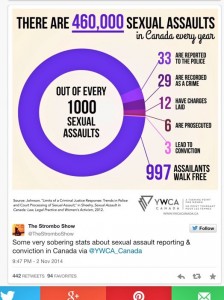 In reflecting on the fact that I have experienced little if any classic sexual harassment, I have wondered whether I was randomly lucky, or perhaps, more likely, people instinctively knew that I am well aware of the ethical divides around public and private information, and that I know when information can and should be made public, rather than conveniently swept under the carpet.
In reflecting on the fact that I have experienced little if any classic sexual harassment, I have wondered whether I was randomly lucky, or perhaps, more likely, people instinctively knew that I am well aware of the ethical divides around public and private information, and that I know when information can and should be made public, rather than conveniently swept under the carpet.
It has been my experience that most people tend to ascribe confidentiality or privacy labels to information quite erroneously. As a consequence, they engage in the kind of self-censorship that ultimately protects bullies and harassers. I can only speculate that one reason for this, is that most people have limited activist experience (not the case for me).
Additionally, my two male thesis supervisors were phenomenally supportive of and respectful of me. I've wondered if that also played into the dynamic, wherein potential harassers would have known or guessed that I would immediately have: A. told 2 very senior male academics who would have had my back and B. that I would have no hesitation in writing a letter to the editor of the local newspaper about it.
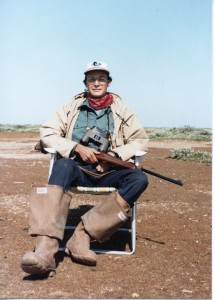
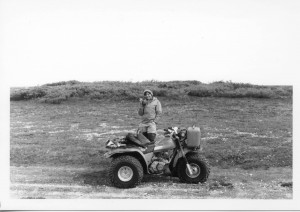 Moreover, starting out as a 19 year-old field assistant running around with a gun for polar bear protection (me, with an ATV, and one of my field assistants, Dan, far left), I wasn't very intimidated by the macho aspect of field biology: I have more than enough crazy field biology tales of my own to top those of male biologists seeking to impress!
Moreover, starting out as a 19 year-old field assistant running around with a gun for polar bear protection (me, with an ATV, and one of my field assistants, Dan, far left), I wasn't very intimidated by the macho aspect of field biology: I have more than enough crazy field biology tales of my own to top those of male biologists seeking to impress!
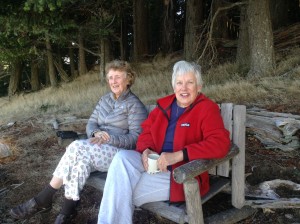 Whatever the reason(s) for my experience versus those of others, the bottom line is that 35 years after I completed my first research field season in 1980, I'm still attempting to shift STEM's very conservative socio-cultural norms. While this continues to be an uphill battle, I definitely feel like the number of voices advocating for this same goal, are truly on this rise, though, truth be told, I have never felt isolated in this endeavour and always had a strong network of mentors and supporters, like UBC profs, Kathy Martin, left & Judy Myers, right.
Whatever the reason(s) for my experience versus those of others, the bottom line is that 35 years after I completed my first research field season in 1980, I'm still attempting to shift STEM's very conservative socio-cultural norms. While this continues to be an uphill battle, I definitely feel like the number of voices advocating for this same goal, are truly on this rise, though, truth be told, I have never felt isolated in this endeavour and always had a strong network of mentors and supporters, like UBC profs, Kathy Martin, left & Judy Myers, right.
Nevertheless, I've been thrilled to encounter, through social media, like-minded younger (to me) colleagues, like Victoria Metcalf (of the Ice doctor blog snap above), Hope Jahren, Jonathan Eisen and Alan McElligott, from whom I have learned a ton about the UK's Athena Swan programme. Alan's insights and experiences in advocating for women and other minorities in STEM, are both fascinating and hair-raising: dude, I totally need to buy you a double martini (it ended up not being a martini but some very nice wine over a Thai meal in London)! I've really loved learning about initiatives like Finding Ada and about the women and men dedicated to telling herstory of women in science, rather than history.
Finally, because doing the same things over 35 years to advocate for women in science at the individual level is very tedious, I decided a year ago, to try a different approach. In my Winter 2014 plant ecology course, for one assignment, all the students, regardless of gender, researched and wrote wikipedia pages about female biology profs for whom they didn't exist, or were very sparse! This was a very cool, positive assignment, that better prepared both young men and women to advocate for diversity in STEM.
How many people can we fit in one selfie? #biol4090 #lab1bestlab pic.twitter.com/1xXt7Kw8wU
— Julia M (@BIOL4095JuliaM) February 10, 2014
Happy New Year,
Dawn Bazely

